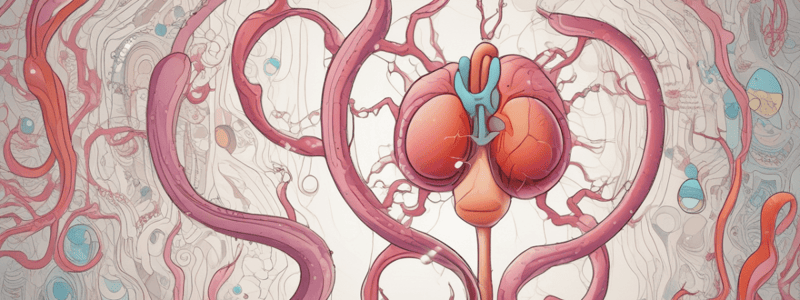Podcast
Questions and Answers
Which of the following statements accurately describes the role of vasopressin in regulating water excretion?
Which of the following statements accurately describes the role of vasopressin in regulating water excretion?
- Vasopressin directly increases the glomerular filtration rate, leading to increased urine output.
- Vasopressin promotes water reabsorption in the collecting ducts, leading to increased urine flow. (correct)
- Vasopressin stimulates the release of aldosterone, which in turn promotes sodium reabsorption, leading to increased water retention.
- Vasopressin inhibits the activity of aquaporins in the collecting ducts, resulting in reduced water reabsorption.
Which of the following conditions would likely lead to a decrease in vasopressin secretion?
Which of the following conditions would likely lead to a decrease in vasopressin secretion?
- Increased intake of water.
- A decrease in blood osmolality below the threshold value. (correct)
- Arterial underfilling.
- Severe fatigue and physical stress.
The independent regulation of water and solute excretion is crucial for maintaining homeostasis. What is the primary mechanism that enables the kidney to excrete different volumes of water without significantly altering solute excretion?
The independent regulation of water and solute excretion is crucial for maintaining homeostasis. What is the primary mechanism that enables the kidney to excrete different volumes of water without significantly altering solute excretion?
- Changes in glomerular filtration rate.
- The countercurrent multiplier system.
- The renin-angiotensin-aldosterone system.
- Renal concentrating and diluting mechanisms. (correct)
What is the approximate threshold value of blood osmolality that triggers an increase in vasopressin secretion?
What is the approximate threshold value of blood osmolality that triggers an increase in vasopressin secretion?
Which of the following is NOT a homeostatic function regulated by the kidney?
Which of the following is NOT a homeostatic function regulated by the kidney?
Flashcards are hidden until you start studying
Study Notes
Kidney Functions and Homeostasis
- The kidney plays a crucial role in maintaining homeostasis through various functions including water excretion, NaCl excretion, acid-base balance, K+ balance, and urea excretion.
- Regulation of water and solute excretion by the kidney occurs independently, allowing simultaneous maintenance of various homeostatic needs.
Water and Solute Excretion
- The kidney can adaptively excrete different volumes of water without significantly altering solute excretion, showcasing its ability to respond to changes in water intake.
- This regulatory capability hinges on renal concentrating and diluting mechanisms, which are essential for effective kidney function.
Role of Arginine Vasopressin (AVP)
- Arginine vasopressin (AVP), also known as antidiuretic hormone (ADH), is the key hormone regulating renal water excretion.
- Vasopressin levels are primarily controlled by osmoreceptors in the hypothalamus, which increase hormone secretion in response to elevated plasma osmolality exceeding approximately 292 mOsm/kg H2O.
Modulation of Vasopressin Secretion
- Other physiological factors (e.g., arterial underfilling, fatigue, stress) can influence vasopressin secretion, sometimes overriding osmotic triggers.
- As plasma osmolality rises, the posterior pituitary gland releases more vasopressin into the bloodstream, affecting kidney function.
Urine Flow and Osmolality
- Plasma vasopressin levels dictate urine flow rates; during conditions of high vasopressin (extreme antidiuresis), water excretion can decrease by over 100-fold compared to conditions of low vasopressin (major water diuresis).
- Significant changes in urine volume are achieved without correspondingly substantial changes in solute excretion, emphasizing the kidney's dual functional capacity.
Kidney's Concentrating and Diluting Functions
- At low vasopressin levels, urine osmolality is lower than plasma, indicating the kidney's diluting capability.
- Conversely, high vasopressin levels lead to increased urine osmolality, reflecting the kidney's concentrating ability and its critical role in body fluid balance.
Studying That Suits You
Use AI to generate personalized quizzes and flashcards to suit your learning preferences.



